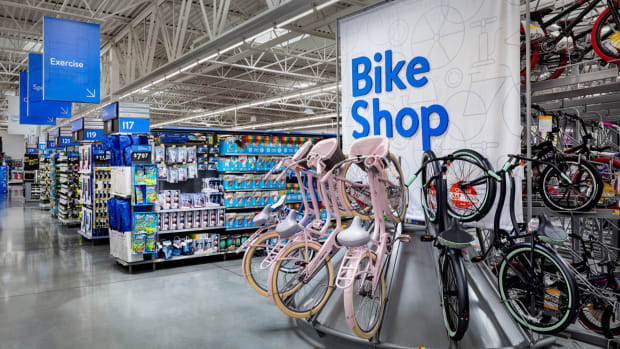It's not rocket science to make the inference that rising inflation is hurting American consumers, especially in poorer households.
The headline consumer price index for the month of February was estimated to have risen 7.9% from last year, up from the 7.5% pace in January and the fastest in four decades, data from the Bureau of Labor Statistics indicated.
And the expected pace of consumer price increases over the next 12 months has also jumped since Russia's invasion of Ukraine, nearly four weeks back.
In addition, U.S. retail sales growth slowed sharply last month, according to data from the Commerce Department. And U.S. consumer confidence hit a 10-year low this month.
Around the world, retailers are having to manage prices despite higher procurement costs. And their plan is to keep prices lower.

Walmart
Wal-Mart Wants to Keep Prices Low
Retail giant Walmart (WMT) which prides itself for its low costs and has traditionally used monikers like "everyday-low-price" said it has cut costs in price-sensitive categories like grocery and electronics.
"We're working closely with our suppliers to manage inflation, finding a few places where we can roll back prices," said Walmart President and Chief Executive Doug McMillon during its fourth-quarter earnings call last month. "And we're paying close attention to how we manage our opening price point items," he added.
"We've got rollbacks in consumer electronics and parts of dry grocery. And those values really matter as customers become more concerned and they think more about inflationary pressures. So, we'll continue to be an everyday-low-price retailer. That's our platform," said Walmart U.S. President and Chief Executive John Furner at the same earnings call cited above.
Despite rising supply-chain and labor costs, the largest retailer in the country reported a profit of $3.56 billion for the holiday quarter.
"We think about things like opening price points and protecting for a lower-income family some of the things that they need from a staples point of view," said McMillon.
"We use rollbacks to communicate not only the reality of prices are coming down at some places, but the emotion or perception we want customers to have about us being there for them and earning their trust during a period of time like this," added McMillon.
"At a time when prices are rising in so many parts of the economy, being able to offer customer value and fight inflation is what we do. It's what our merchants do," Furner added.
Big-box retailer Target (TGT), which recently surpassed $100 billion in revenue, also echoed a similar sentiment but didn't actively cut prices.
Target Wants to Protect Prices
Target said it will "protect prices whenever possible."
"We know how to deliver exceptional value and manage profitability. We can protect prices whenever possible. We can offer an unbeatable range of owned and national brands across our portfolio categories. We can bake value into our assortment, and we'll work with our vendor partners from sourcing to production to shipping," said Chairman and Chief Executive Brian Cornell in Target's latest earnings call.
"We'll ensure that those prices we offer will always be among the best in American retail," Cornell added.
Rival Amazon (AMZN), which is also reeling under the pressure of rising labor costs, has not dropped prices of items, per say, but Chief Financial Officer Brian Olsavsky said that the company is "working hard" to offer lower prices, better selection, and more convenience as part of its goal to deliver a good customer experience.







